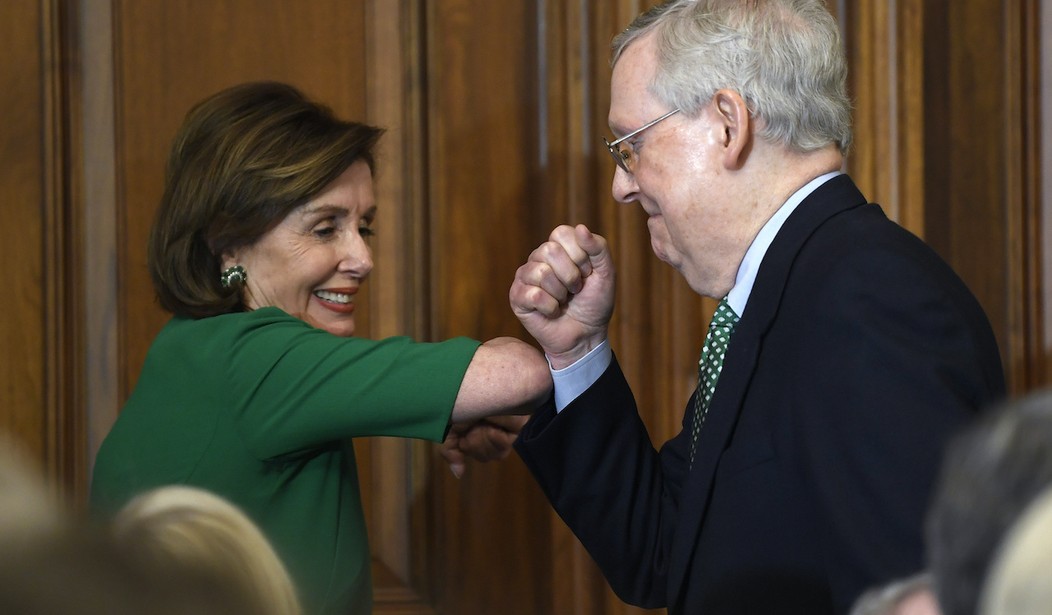Though President Trump’s odds of prevailing in the recent election diminished greatly after the Supreme Court refused to hear the case brought by Texas and eighteen other states based on gutlessness lack of standing, there are other aspects of the challenge working towards a conclusion. One of these strategies being considered is for a senator or member of Congress to object to the votes submitted by the half-dozen or so states where fraud or gross incompetence was the rule of the day.
How it would work is like this. On January 6, the votes of the Electoral College will be submitted to Congress. As the votes are announced in each House and state-by-state, the Electoral Count Act of 1887 permits senators and members of Congress to submit written objections to the results from any state. This is not unheard of. In 2017, several Democrat members of the House objected to several state votes for President Trump, because they were either dishonest hacks or nitwits who had been sucked into the Brennan/Clapper/Comey Russia Hoax.
The catch is that an objection in one chamber of Congress is meaningless. It is where at least one member of each chamber objects to the votes of the same state. When that happens, counting ceases, as the chambers meet and take a vote on the objection. This has happened once in recent history. In 2005, the aptly-named Senator Barbara Boxer and the aptly-named Representative Stephanie Tubbs challenged Ohio’s votes based on allegations of improperly-functioning voting machines.
If only one chamber votes to reject the votes, they are accepted. If both chambers reject the Electoral College votes, we are in uncharted waters and dueling slates of electors. This is why GOP electors in AZ, MI, PA, etc., made a big deal about meeting to vote on December 14, so that even though their votes were not certified by the state, they could play a role in a contested election. There is no guarantee that some sort of unity ticket wouldn’t emerge. Just remember, “No man’s life, liberty or property are safe while the Legislature is in session.”
Right now, there is at least one House Republican, Mo Brooks from AL-5, who will object to several state votes. He will probably be joined by Marjorie Taylor-Greene (GA-14), Barry Moore (AL-2), and Bob Good (VA-5). The trick will be getting a partner in the Senate. Supposedly, four senators have expressed an interest in participating. These would be Josh Hawley (MO), Ron Johnson (WI), Rand Paul (KY), and Kelly Loeffler (GA, assuming she wins her special election).
Congressional Challenge: @RepMoBrooks calls out the GOP’s Surrender Caucus, who refuse to join in with his plan to challenge fraudulent electoral college votes. #MAGA #AmericaFirst #Dobbs pic.twitter.com/G4WLPSrvOO
— Lou Dobbs (@LouDobbs) December 14, 2020
Axios reports that McConnell, along with John Thune and Roy Blunt, was on a conference call yesterday where they encouraged their caucus not to get involved. The story pushed by the media and various quislings and VichyCons is that this is a meaningless vote and a “hard” vote.
One of these is bullsh**; the other is true, but not for the reason being claimed.
On the surface of it, the odds of the Democrat House voting to refuse any of the Electoral College votes approaches zero. A Senate with a Mitt Romney and Susan Collins and Lisa Murkowski (and it seems a McConnell, Blunt, and Thune) is also quite a reach. But you don’t know that until you count the votes. In the words of Hockey legend Wayne Gretzky, “You miss 100% of the shots you don’t take.” If nothing else, a vote would lay down a marker that the Senate and the House GOP caucuses stand four-square with the American people in refusing to acknowledge Joe Biden as a lawfully-elected president. So, not voting because you may not win is a loser’s strategy. If the nation had followed that philosophy, we never would have declared independence from Britain, and Texas and the southwest would still belong to Mexico.
The claim that this is a “hard vote” is tossed around as though doing the right thing, no matter if it is difficult, is a bad thing. SPOILER ALERT: it isn’t. They are actually elected to show a bit of courage every decade or so. The vote is hard for Red State Democrats, like Joe Manchin, who would have no place to hide if they voted to recognize Electoral College votes based on very questionable election procedures. It would also be a tough vote for NeverTrumper Vichy Cons, who would be facing a bruising primary challenge the next time around. And, for that reason alone, we need to have a vote no matter how preordained the outcome seems.
The Democrats are a bit fearful of the vote because their margin in the House is very small, and there is no guarantee their Senate caucus would not have defections.
On the whole, the upside for the GOP far exceeds any downside.
The VichyCons will have this vote tattooed on their forehead forever.
Pressing a fight will keep faith with the GOP base that came out in record numbers to vote in 2020 and will serve as a rallying point for 2022.
Joe Biden’s presidency will be publicly flagged as fraudulent.
The issue of electoral integrity will be shoved to the forefront of the national agenda because, without a reliable means of conducting elections, we cease to exist as a Republic.













Join the conversation as a VIP Member